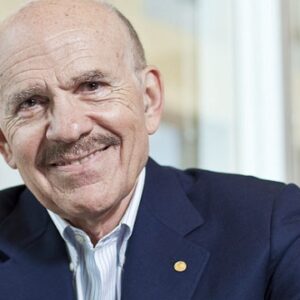Louis J. Ignarro is an American pharmacologist who shared the Nobel Prize in Physiology or Medicine in 1998 for his research on nitric oxide properties. He has received several prestigious awards in addition to the Nobel Prize, including the American Heart Association’s Basic Research Prize for his outstanding contributions to the advancement of cardiovascular science. He is a professor of pharmacology at the UCLA School of Medicine’s department of molecular and medical pharmacology in Los Angeles, as well as the founder and editor-in-chief of ‘Nitric Oxide Biology and Chemistry.’ He had a natural aptitude for chemistry as a young boy, having been interested in science since he was a child. He went to Columbia University after graduating from high school, where he studied chemistry and pharmacology and earned a bachelor’s degree in pharmacy. He then went on to earn his Ph.D. in pharmacology from the University of Minnesota, which had one of the best pharmacology departments in the country at the time. Following his doctorate, he began a career in drug development, during which time he conducted important research on the properties of nitric oxide and its medical applications.
Childhood and Adolescence
Louis J. Ignarro was born in Brooklyn, New York, on May 31, 1941, to Italian immigrants. Angelo, his younger brother, is his only sibling. His father worked as a carpenter, and his mother took care of the house and the boys.
He used to spend his childhood summers swimming in the ocean and building sand castles. He had always been interested in science and was enthralled by the chemistry set he received when he was eight years old.
He went to Central Elementary School and Long Beach High School, where his interest in chemistry grew. He studied chemistry and pharmacology at Columbia University after high school and graduated with a bachelor’s degree in pharmacy in 1962.
He then went on to earn a Ph.D. in pharmacology from the University of Minnesota in 1966. He took an extremely difficult enzymology course at university, taught by future Nobel laureate Paul Boyer. He also studied cardiovascular physiology and took biochemistry and anatomy classes.
Career Louis
Louis J. Ignarro accepted a postdoctoral position at the National Institutes of Health (NIH) in the Laboratory of Chemical Pharmacology of the National Heart, Lung, and Blood Institute after finishing his doctorate.
The atmosphere was energizing, and the young scientist learned a lot from his brilliant mentor, Elwood Titus, and collaborated with a number of others to discover cardiovascular system regulatory mechanisms.
Ignarro left the NIH in 1968 to lead the biochemical and anti-inflammatory program at Geigy Pharmaceuticals. He was involved in the development and marketing of a new nonsteroidal anti-inflammatory drug while he was there (diclofenac).
This position also allowed him to continue his research into new areas of pharmacology, such as cyclic GMP. In the early 1970s, Geigy Pharmaceuticals merged with Ciba Pharmaceuticals, and Ignarro left to become an Assistant Professor of Pharmacology at Tulane University School of Medicine in New Orleans. In 1979, he became a professor there, a position he held until 1985, when he moved to the University of California, Los Angeles, to become a professor of pharmacology.
He became involved in the groundbreaking research that would eventually earn him the Nobel Prize in the 1970s and 1980s. Around this time, scientists Robert F. Furchgott and Ferid Murad had already demonstrated that cells in the endothelium, or inner lining, of blood vessels produce an unknown signaling molecule called endothelium-derived relaxing factor by Furchgott (EDRF).
Louis J. Ignarro used several tests to determine that EDRF was nitric oxide. This was the first time a gas was shown to function as a signaling molecule in a living organism. Further research in this field revealed that nitric oxide has a wide range of applications in the pharmaceutical industry, potentially leading to better treatments for heart disease, shock, and cancer.
He began working as a paid consultant for Herbalife in 2003, eventually becoming a member of the company’s Scientific Advisory Board. He has also appeared in videos promoting Niteworks and other Herbalife products. He has worked with the company to develop nutritional and dietary supplements such as Niteworks.
Major Projects of Louis
He demonstrated nitric oxide’s signaling properties, which have important implications in cardiovascular medicine. His work on nitric oxide paved the way for more research, which is likely to lead to better heart disease, shock, and cancer treatments. Indirectly, the anti-impotency drug Viagra is based on his research principles.
Achievements & Awards
The Nobel Prize in Physiology or Medicine was jointly awarded to Louis J. Ignarro, Robert F. Furchgott, and Ferid Murad in 1998 “for their discoveries concerning nitric oxide as a signaling molecule in the cardiovascular system.”
In 1998, he received the American Heart Association’s Basic Research Prize for outstanding contributions to the advancement of cardiovascular science. He is a member of the American Academy of Arts and Sciences and the National Academy of Sciences.
Personal History and Legacy
Louis J. Ignarro has been married twice. His first marriage ended in divorce, but he did have a daughter. In 1997, he married Sharon Elizabeth Williams.
He is a fitness enthusiast, a marathon runner, and a cyclist who has completed 13 marathons. He is a public speaker on the topics of health and wellness in his association with Herbalife.
He is a popular and charming personality in addition to being a brilliant Nobel laureate.
Estimated Net Worth
As of August 7, 2020, Louis Ignarro’s estimated net worth is at least $419 thousand dollars. Louis Ignarro owns over 700,000 units of CytRx stock, valued at over $418,765, and has sold CYTR stock worth more than $0. In addition, as an Independent Director at CytRx, he earns $0 per year.


